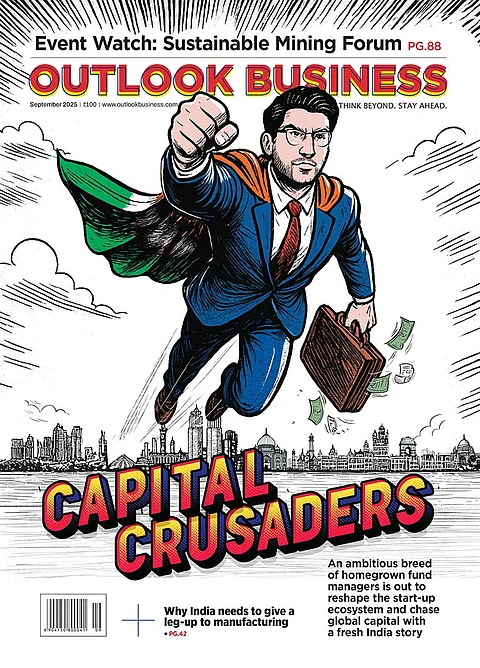Ashni Biyani is the first woman from her family to step out of home to attend college. If that sounds a little startling, it is important to note that she grew up in a Marwari joint family. There were 22 members in a large house in South Mumbai, with a common kitchen that, by her own admission, served great food all the time.
It was this milieu that honed her people skills. “I certainly did not grow up in a conservative family. My father has always been a liberal and comes close to being a contrarian or even a rebel,” she says. No opinion was ever imposed on her or for matter her younger sister, Avni, as they were growing up. “We made our own choices and it was a case of life just unfolding on most occasions. Nothing was really planned ahead of time,” recalls the 31-year-old.
Ashni says she possesses a lot of curiosity, a trait that she has inherited from her father, Kishore Biyani, Future Group’s founder. “He has a certain way of looking at people and analysing them,” is how she puts it. Like her father, she has an obvious fascination and intrigue for human behaviour. “It could be how technology is causing shifts there, or just the unmiddleclassing of the Indian mindset,” she quips. This is what keeps her mind ticking all the time.
Learning the ropes
The summer break for an eight-year-old is most often about playing with friends and having a good time. But for Ashni, it was about work. “At that point, our stores were about to be launched and Dad used to be in the respective city for about a fortnight before that. The family tagged along and I just observed what he saw and did what he was doing,” she says. The tasks on hand included being a part of the team or just putting the merchandise on the shelf. As she got older, Ashni was able to absorb a lot more, without realising it was work. “The basics were learnt intuitively and it came to us as we did it. More importantly, I saw what it takes to give birth to an idea,” she says.
In many ways, that is how the whole process of seamlessly integrating work with routine took place. “Even now, they are not hardbound realities and interconnect quite easily,” maintains Ashni. To drive home the point, she goes back to the time when Biyani was opening his Pantaloons stores. “While that was taking place, we saw the emergence of the Indian consumer. It was what we kept discussing at home all the time,” she recalls. It was quite normal for her to be at a mall on a Sunday not just to hang out, but count the number of bags that had on them the Pantaloons or Big Bazaar logo.
Around this time, Biyani’s advice to her was simple and incisive. It was about keeping one’s eyes and ears open. “It was more about understanding than doing. I call it the process of learning through osmosis,” is her way of looking at it. That counsel was handy because even as a student in Class 9, she would sit at Biyani’s meetings without saying anything. When Pantaloons opened its doors in the mid-1990s, the young girl remembers being intrigued about people coming in cars or autos to the store. “I still remember the smell of fumes and the struggle to open a store,” she recalls.
 Being the offspring of a first generation entrepreneur meant she could see the making of a business, as compared to one that already existed. “We interacted with KB (that’s how she addresses her father) like adults. He would often bring the merchandise home and we would talk about it,” says Ashni. Speaking about the inherent advantages of being born in a business family, Ashni views it very differently. It facilitated the process of being more curious and picking up learnings about the Indian consumer. “I never studied business and I was simply applying what I had seen or heard, thereby making sense of consumer behaviour,” she maintains.
Being the offspring of a first generation entrepreneur meant she could see the making of a business, as compared to one that already existed. “We interacted with KB (that’s how she addresses her father) like adults. He would often bring the merchandise home and we would talk about it,” says Ashni. Speaking about the inherent advantages of being born in a business family, Ashni views it very differently. It facilitated the process of being more curious and picking up learnings about the Indian consumer. “I never studied business and I was simply applying what I had seen or heard, thereby making sense of consumer behaviour,” she maintains.
That power of observation, points out Ashni, is her strength. “It is a big help in the consumer business, where seeing is believing. It is easier to relate to the concept since all of us are consumers,”she says. Ashni recollects her father telling his employees that they would get appropriate clues from what consumers picked up in their shopping trolley. That was an absolute indication of changing trends, compared to the past where there were only specific products that were bought. Additionally, he asked them to observe similar features like how consumers were dressed, whether someone came in sunglasses or bermudas, and eventually ask his staff to take stock of those products.
Ideas flow
Setting up Future Ideas was luck by chance and had never crossed Ashni’s mind as a student at Bengaluru’s Srishti Institute of Art, Design & Technology, from where she graduated in 2006. This was followed by courses on scenario planning at Parsons School of Design in New York and a course in general management at Stanford Graduate School of Business. Once she was back to India, she was still indecisive about her future course of action.
 When Biyani was looking to set up an innovation team, his daughter seamlessly became a part of it. An early assignment was her involvement in Holii, a fashion accessory brand, where Ashni worked on designing the product. Holii was eventually launched as a joint venture between Future Group and Hidesign India. “Future Ideas was created as not just an arm for innovation and incubation but as a full-fledged company,” she adds.
When Biyani was looking to set up an innovation team, his daughter seamlessly became a part of it. An early assignment was her involvement in Holii, a fashion accessory brand, where Ashni worked on designing the product. Holii was eventually launched as a joint venture between Future Group and Hidesign India. “Future Ideas was created as not just an arm for innovation and incubation but as a full-fledged company,” she adds.
Ashni calls Biyani her critic, mentor and the karta (head of the family) of the Future Group and in the same breath, she makes it clear that the boss’ style is to give direction and let go. “He lets you learn, fail and just lets you be,” is her description of her father at work. According to her, Biyani says there are two sides to business — art and science. “I was always aligned to the creative side, which made it interesting to understand habits, preferences and buying patterns of consumers,” thinks Ashni. The scope of consulting was not restricted just to the Future Group and was triggered after being contacted by a retailer in the UAE, who wanted to get a better understanding of consumer behaviour. “There was no clash of interest and we still do a lot of work for him,” she says.
The big moment, though, was transforming the larger Big Bazaar stores into family centres, one of Ashni’s concepts, for which she relied greatly on Biyani’s guidance. The transformation that started in late 2009, saw large Big Bazaar outlets, with an area of at least 70,000 square feet, converted into family centres with an area of 100,000 square feet. The objective was to make the centres a family destination, where food services like chaat counters would also be available. It included new sections like electronics and furnishing, not available previously in a conventional Big Bazaar store. It also offered more options with the existing product range. Ashni wanted to incorporate her observation of bringing in family to make the stores more consumer-friendly in nature, instead of just restricting it to shopping.
Making a mark
A good part of Ashni’s working hours is devoted to Future Consumer Enterprise Limited (FCEL), where she is a director. Positioned as a sourcing-to-supermarket food company, her immediate task on hand at FCEL is to create multiple brands, with the foray into atta, being one that she speaks of passionately. Launched in January this year, Desi Atta Company is a range of flours and mixes, which will take on the organised and unorganised market. “We conceptualised it from scratch at Future Ideas and it is now a brand at FCEL. It feels great to see it stand as an independent brand today,” says Ashni with a broad grin.
With Future Group already well-established in retail, taking the story forward with FCEL will keep her busy. “Building an organisation around consumer behaviour is interesting. This is a start-up with wisdom bringing in some method to the madness, which makes this marriage exciting,” she says. Ashni draws inspiration from the heterogeneity of India and not surprisingly, her father, for his ability to process information. “I am very close to him and we constantly exchange notes on human behaviour. It could be societal shifts, new patterns or evolutions with respect to consumer habits, which are some points on which we connect really well,” she says.
If the streak of entrepreneurship comes from Biyani, the role of her mother is equally important. “She is our backbone and the pillar of the family. She has the ability to keep everyone happy,” says Ashni. In 2009, she got married to Viraj Didwania, who is Vedanta Group chairman, Anil Agarwal’s nephew. The couple had a daughter last April and Ashni speaks of spending time with her as a way to unwind. “I do not view motherhood as a burdening role, but as one that is actually a lot of fun. I really don’t think it has changed me as a person,” she sums up.












 Just one email a week
Just one email a week